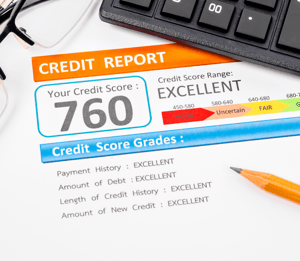You know you want to buy a new home, but understanding the hidden algorithms that financial lenders use to determine whether or not you might qualify for a loan can be difficult to understand.
Between the anxiety of committing to such an important decision and the uncertainty about how you'll be assessed, it's no wonder that many people find home buying a stressful experience.
That's why we've put together this article. Once you understand how you'll be viewed by banks and financial lenders, you'll know exactly what to expect and how to prepare for your mortgage application.
Changes to Canadian Law
Some of the most important factors in assessing your qualifications were implemented in late 2016. Currently, all home buyers are required to put down at least 5% of the purchase price of the home as a down payment, but any down payments less than 20% must be supplemented with mortgage insurance.
A down payment of less than 20% is considered a "high ratio" mortgage. The new law includes a stress test requirement that calculates whether a person with a high ratio mortgage will continue to be able to pay off their loan if interest rates rise in the future. The stress test requires that high ratio borrowers are spending 39% or less of their income on home costs, including mortgage payments, utilities, and taxes.
 Income Verification
Income Verification
Of course, you'll need to provide proof of income demonstrating you can pay for a mortgage. When you meet with the lender, bring along tax returns and other documents from the past two years as you'll be assessed on your average monthly income as well as your current rate of pay. If you receive income from other sources like alimony or child support, be sure to bring those documents as well.
If you have a regular, full-time job, providing income verification is easy. But even for freelancers, what matters most is establishing your average monthly income. Bring all of the receipts, tax documents, and other forms of proof in your possession so that the bank or financial institution can accurately assess your ability to pay back a loan.
Debts
Whether it's credit card debt or some other form of financial obligation, these will be assessed when you apply for a loan. Be sure to be completely upfront about all of your outstanding financial obligations. But don't think you'll be automatically disqualified if you owe money. What matters most to banks and financial institutions is your consistency and ability to pay off your debts as expressed by your credit report.
Credit Report
People often confuse their credit reports with their credit score. Although these two things are related, they're not exactly the same.
In Canada, there are two national credit bureaus: Equifax (Canada) and TransUnion (Canada). Because merchants and banks report to these two bureaus separately, your credit report may be different for each bureau, so you'll need to get a report from both of them.
Both bureaus will provide a copy of your credit report for free as long as you don't mind waiting for it to be mailed to you. To do so, apply online at Equifax's website and TransUnion's website. You will be requested to provide a scanned image of two pieces of identification as well as some personal background information. It takes 2-3 weeks before you'll receive your credit report.
Once you receive your credit report, it's absolutely essential you check it for errors. Unfortunately, as many as 20% of people in Canada will have errors in their credit report. Sometimes these are minor issues, but other times they can be serious errors that will affect your ability to qualify for a loan. If you do spot an error, you'll need to dispute it with the bureau in order to clear up the problem.
 Credit Score
Credit Score
The credit score, on the other hand, is a simple number that reflects all the data in your credit reports. So why does your credit score matter?
Because both the bureaus are privately-run companies, how they calculate your credit score is a trade secret, but what matters most is your reliability in paying off debts on time – this presents you as less of a "risk" to lenders.
It's also well-known that making timely payments but still carrying a balance at the end of the month improves your credit score while paying off all your debts is actually less helpful towards improving your credit score. It's very important to take the time to understand the truth about credit scores.
For reasons no one quite understands, the numbers go from 300 to 900, with 900 being the best. It's usually best if your credit score is higher than 750, but a score lower than 650 will probably disqualify you from a loan.
If your credit score is lower than you'd like, the best way to improve it is to ensure that you make all your debt payments on time. Uncertainties about your credit report and score can also be addressed through questions you ask your mortgage lender.
A combination of your average income, your credit history, and the amount of money you can put forward as a down payment are what the bank or lending institution will assess in order to determine whether or not you qualify for a loan. By understanding these metrics ahead of time, you'll be much more confident when it comes time to secure a mortgage for the home you've always wanted.




